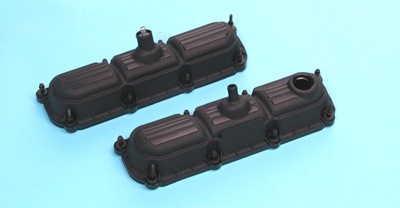| Summary: |
First North American high volume thermoplastic valve cover
eliminating e-coat and topcoat steps required by metal cover.
Weight savings: 4 lbs per engine.
Cost savings: 20%. |
| Most Innovative Feature: |
First high volume thermoplastic valve cover for North
America delivers significant cost, weight, environmental benefits compared
with metal predecessor; and overcomes barriers to entry in North America.
Debuts on the 2003 DCX Chrysler Town and Country, Dodge Minivan
3.3L and 3.8L V6 engines as running change. |
| Other Innovative Features: |
VS Metal - thermoplastic eliminates e-coat and topcoat
steps; cuts weight 66%; cuts cost 20%; allows integrated air-oil separator
to vastly improve emissions and meet California Air Resources Board
regulations; extends oil life 120% to 100,000 miles/quart.; allows
multi-function design (integral PCV valve housing formerly located in the
breather tube); eliminates secondary machining; allows integrated oil
separator without additional assembly steps; can re-use runners and scrap;
component can be melt recycled. Going
from CAD to commercial production in 22 weeks delivered benefits that
could be realized in current model year saved $2 million in pull-ahead
program benefits. |
| What Forming Process? |
N/A. |
| First Time Process Used: |
Yes - this is the first high-volume, injection-molded
thermoplastic rocker cover for for a North American OEM. |
| Previous Process: |
Replaced steel stamping.
Going from CAD to commercial production in 22 weeks (no prototype)
delivered benefits that could be realized in current model year - longer
development would have cost $2 million in uncaptured savings. DuPont
assisted with CAE, moldflow, warpage, structural and modal analysis. |
| Tooling Innovations: |
Mold surface sandblasted for unique, matte finish required
by styling. |
| New Material Developments: |
Special low warp, appearance grade of Minlon glass/mineral
reinforced nylon 66 to balance stiffness, strength and dimensional
stability required for the part. |
| Weight Savings: |
4 pounds per engine. |
| Cost Savings: |
20% cost savings PLUS going from CAD to commercial
production in 22 weeks delivered cost benefits that could be realized in
current model year - longer development would have cost $2 million in
uncaptured savings. |
| Cost Avoidance: |
Eliminated costly e-coat, topcoat processes; weight
reduction reduced worker fatigue/improved ergonomics; vehicle meets CARB
regulations so it can be sold in California without retrofit. |
| Direct Consumer Benefit: |
Extends oil life 120% to 100,000 miles/quart.
Improves emissions/meets emerging emissions regulations; great
styling; cost containment. |
| Translates to Other Vehicles?: |
Yes. This
technology can be used on most automotive engines; features an integrated
PCV valve to protect against tampering with emission-control
devices/hoses. |
| Safety Benefits: |
N/A. |
| Environmental Benefits: |
Integrating PCV valve into rocker cover ensures emissions
controls are not tampered with in accordance with California Air Resources
Board regulations. Cover can be melt recycled; can used recycle content
materials. |
| Additional Comments: |
First valve cover assembly to successfully complete
Chrysler's "Gasket Killer" Test.
7 psi @ 300F for 1000 hours without any leakage. |






